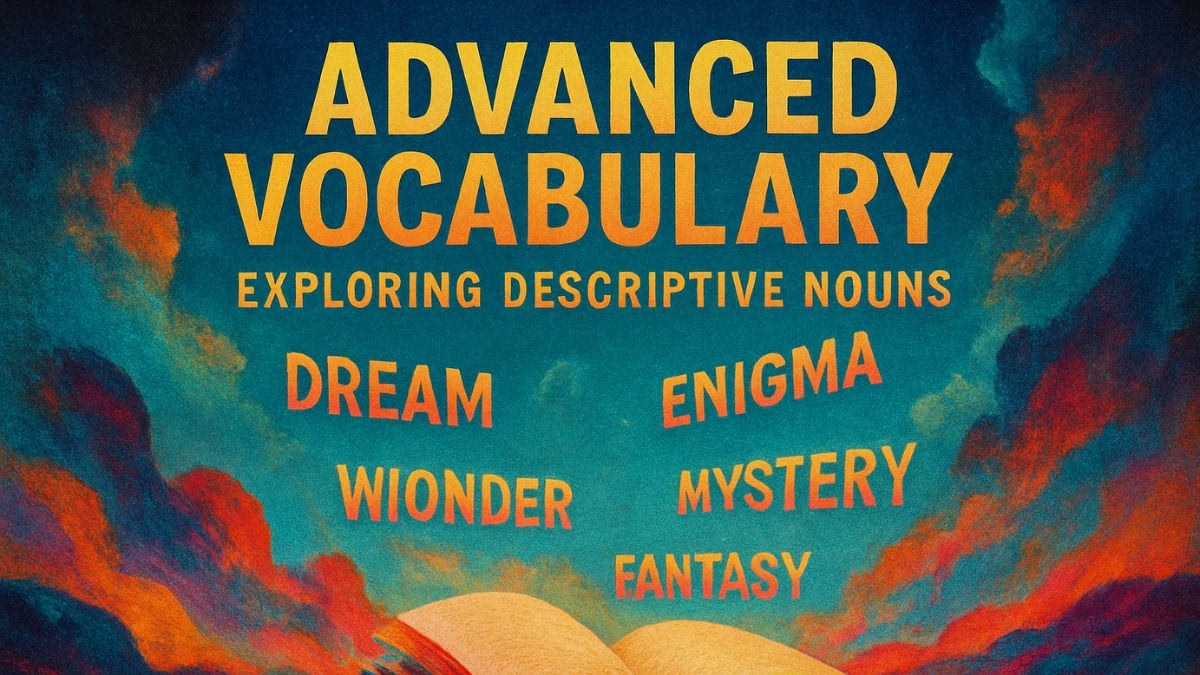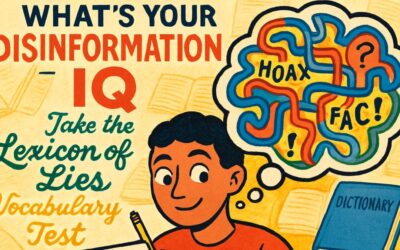Introduction
Welcome to a vocabulary challenge designed not just to test you, but to teach you. Have you ever felt like you were using too many words to describe a simple idea? Do you want your English to sound more sophisticated, precise, and impactful? This quiz is your next step.
We will explore the world of Descriptive Nouns – powerful, single words that can replace entire phrases, making your communication more elegant and efficient. Instead of saying, “she was the perfect example of a modern leader,” you can say, “she was the epitome of a modern leader.” See the difference?
This isn’t a passive reading exercise. Each question places you in a real-world scenario where you must choose the most fitting noun. The magic happens in the hints and feedback. Before you choose, a hint will guide your thinking. After you choose, detailed feedback will explain not only why the correct answer is right, but also why the other options aren’t the best fit.
By the end of this quiz, you will have:
- Learned 20 powerful, advanced nouns.
- Understood how to use them accurately in context.
- Gained the confidence to incorporate them into your own speaking and writing.
Prepare to elevate your vocabulary. Let’s begin.
Learning Quiz
This is a learning quiz from English Plus Podcast, in which, you will be able to learn from your mistakes as much as you will learn from the answers you get right because we have added feedback for every single option in the quiz, and to help you choose the right answer if you’re not sure, there are also hints for every single option for every question. So, there’s learning all around this quiz, you can hardly call it quiz anymore! It’s a learning quiz from English Plus Podcast.
Quiz Takeaways
Hello and welcome. If you’ve just completed the quiz, congratulations! You’ve wrestled with some of the most elegant and powerful words in the English language. If you haven’t, you might want to try it first, but you’re welcome to stick around either way. Today, we’re going to dive deeper into the concept we explored: Descriptive Nouns.
What are they? Think of them as power-ups for your vocabulary. They are single nouns that do the work of an entire descriptive phrase, allowing you to express complex ideas with precision and style. Saying someone is the ‘epitome of courage’ is far more sophisticated than saying ‘they are a perfect example of what it means to be courageous.’ It’s about being concise without sacrificing meaning. Let’s break down the words from the quiz, grouping them by the kinds of things they describe.
First, let’s look at words used to describe people and their roles.
We had four words that seem similar but have crucial differences: epitome, paragon, archetype, and cynosure.
An epitome is the perfect living representation of a concept. In the quiz, the diplomat was the epitome of grace under pressure. She didn’t just show grace; she embodied it. It’s as if the abstract idea of ‘grace’ became a person.
A paragon, on the other hand, is a model of excellence. The judge was a paragon of virtue. This means he was a perfect model of virtue that others should look up to and emulate. While epitome is about representation, paragon is about being a model of high standards.
An archetype is different again. It’s a typical, universal model or pattern. The ‘wise old mentor’ in stories is an archetype. It’s not about one person being perfect; it’s about a recurring character type that we see again and again in myths and literature across the world. Think of the hero, the trickster, the mother figure—these are all archetypes.
Finally, a cynosure is simply the center of attention. When the famous actor entered the room, he became the cynosure of all eyes. This word isn’t about their qualities (like epitome or paragon); it’s about the effect they have on others.
We also have nouns for specific roles. A doyenne (or doyen for a man) is the most senior and respected person in a field. Professor Vance, with 50 years in physics, was the doyenne of her profession. A proponent is an advocate, someone who argues in favor of a cause, like the woman who was a proponent of renewable energy. This is a neutral, positive word. In contrast, a zealot is also an advocate, but in a negative, fanatical way. A zealot is uncompromising and often dismisses all other points of view, like the man in the quiz who couldn’t handle opposition.
And our last ‘people’ word is linchpin. This is a beautiful, metaphorical word. A linchpin was originally a small metal pin that kept a wheel from falling off an axle. In modern use, it’s a person or thing that is absolutely vital to an organization. Without them, the whole thing falls apart. The head of logistics, who held the supply chain together, was the operation’s true linchpin.
Next, let’s discuss nouns for abstract concepts and ideas.
The most powerful pair here is antithesis and anathema. The antithesis is the direct, polar opposite. The minimalist museum was the antithesis of the ornate old buildings. It’s a neutral word for contrast. Anathema, however, is loaded with emotion. It’s something you vehemently hate because it violates your core beliefs. For the minimalist designer, clutter wasn’t just the opposite of her style; it was an anathema, something she loathed on principle.
Then we have panacea and conundrum. A panacea is a cure-all, a single solution for every problem. The word is almost always used skeptically, to suggest that such a simple solution probably doesn’t exist, as with the wellness app that claimed to solve everything. A conundrum is the opposite of a solution; it’s a difficult, puzzling problem with no easy answer, like the city council’s challenge of funding services without raising taxes.
Our third group is nouns for situations, events, and forces.
A harbinger is a sign of something to come. The eerie silence before the storm was a harbinger of its arrival. It doesn’t cause the event, it just foretells it. In contrast, a catalyst is the direct trigger. The student president’s speech was the catalyst that forced the administration to act. It caused the change.
We have three words for difficult situations: maelstrom, quagmire, and the previously mentioned conundrum. Imagine you’re in trouble. If the trouble is a violent, chaotic, swirling mess of activity, like a panic on the stock market, you’re in a maelstrom. If the trouble is a messy, complex situation where you feel stuck and progress is impossible, as if you’re trapped in deep mud, you’re in a quagmire. And if the trouble is primarily an intellectual puzzle or a dilemma with no good solution, it’s a conundrum.
We also have words for places and high points. A bastion is a stronghold, a place that defends a principle. The old bookstore was a bastion of literary tradition, protecting it from modern trends. A nexus is a central connection point, a hub. The international airport is a nexus of global travel. And finally, a pinnacle is the absolute highest point of achievement, like a mountain peak. Winning the Nobel Prize was the pinnacle of the scientist’s career.










0 Comments